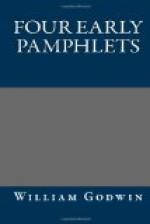[Footnote A: Bohaoddin,
p. 71. He was an eye witness, and had a
considerable share in many
of the transactions of Saladin. He is
generally accurate, and tolerably
impartial. ]
[Footnote B: Ebn Shohnah,
Heg. 589. Abulfarai, Renaudot, p. 243.
D’Herbelot, biblioth.
orient. art. Togrul, &c. ]
As the whole of this excellent work is now before us, it may not be impertinent, before we finally take our leave of it, to attempt an idea of its celebrated author. We are happy in this place to declare our opinion, that no author ever better obeyed the precept of Horace and Boileau, in choosing a subject nicely correspondent to the talents he possessed. The character of this writer, patient yet elegant, accurate in enquiry, acute in reflexion, was peculiarly calculated to trace the flow and imperceptible decline of empire, and to throw light upon a period, darkened by the barbarism of its heroes, and the confused and narrow genius of its authors. In a word, we need not fear to class the performance with those that shall do lasting, perhaps immortal, honour, to the country by which they have been produced.
But like many other works of this elevated description, the time shall certainly come, when the history before us shall no longer be found, but in the libraries of the learned, and the cabinets of the curious. At present it is equally sought by old and young, the learned and unlearned, the macaroni, the peer, and the fine lady, as well as the student and scholar. But this is to be ascribed to the rage of fashion. The performance is not naturally calculated for general acceptance. It is, by the very tenor of the subject, interspersed with a thousand minute and elaborate investigations, which, in spite of perspicuous method, and classical allusion, will deter the idle, and affright the gay.
Nor can we avoid ascribing the undistinguishing and extravagant applause, that has been bestowed upon the style, to the same source of fashion, the rank, the fortune, the connexions of the writer. It is indeed loaded with epithets, and crowded with allusions. But though the style be often raised, the thoughts are always calm, equal, and rigidly classic. The language is full of art, but perfectly exempt from fire. Learning, penetration, accuracy, polish; any thing is rather the characteristic of the historian, than the flow of eloquence, and the flame of genius. Far therefore from classing him in this respect with such writers as the immortal Hume, who have perhaps carried the English language to the highest perfection it is capable of reaching; we are inclined to rank him below Dr. Johnson, though we are by no means insensible to the splendid faults of that admirable writer.




